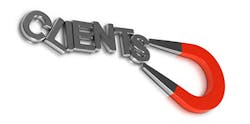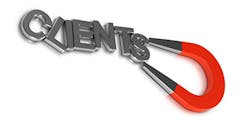Simplifying & Humanizing Client Retention Strategies
As sales director for a commercial mechanical contractor, I get dozens of solicitations each month for software, products, and strategic tools that are advertised as innovative and groundbreaking solutions to customer retention issues. Whether it’s a pitch for the latest and greatest CRM or an offer for guidance from a self-proclaimed “guru” in the industry who backs their effectiveness with out-of-context statistics, the flow of offers that are too good to be true seems to be endless. While I have not yet been driven to seriously consider any of these so-called solutions, I will occasionally respond to the offers and arrange a meeting to hear what these products bring to the table, in order to gauge what the latest trends are in our industry. Invariably, my biggest takeaway from these meetings is that a product that is advertised as simple, efficient, and effective turns out to be frustratingly convoluted and unnecessarily complex – and often wildly expensive.
Nifty tools and intricate systems do not retain clients; your people retain them by how effectively they communicate with them, plain and simple.
Note how I phrased the above statement – customer retention is simple. That does not mean it is easy. Client retention in its most effective form is uncomplicated in nature, but it is not something that can be accomplished without persistent, dedicated effort.
Many of these efforts are inherently reactive, dealing with both internal and external forces as they arise. Internal forces, such as failing to deliver on a promise to a client or neglecting them by failing to act on their requests in a timely manner, are the quickest way to ensure that a captive client doesn’t return for future business opportunities. Addressing internal forces is, of course, an internal effort. Regardless of our team’s level of expertise and professionalism, we will at some point lose clients due to internal issues that were entirely preventable. When that happens, the only way to handle the situation effectively is to refine every process aggressively and relentlessly (even the ones we consider to be effective) to identify issues. Then, we address ongoing matters that haven’t been rectified, acknowledge our team’s internal failures both with clients and with employees, commit to improving, and most importantly, actually take steps to improve.
External forces can be much more complicated to address, and the past year has brought plenty of them to bear – the most obvious being a global pandemic which changed the way every industry operates (including Commercial HVAC). Whether as significant as the rapid spread of Coronavirus or as minor as a direct competitor constantly undercutting your bids for critical projects and snatching work away from your team, the first step in addressing external forces is accepting that we can’t – not directly, at least. Our competitors are always going to try to lowball us, the economy is always going to hit peaks and valleys, and client preferences are always going to fluctuate. Those are not things that we can control. We can, however, control how our team is equipped to respond to those external forces.
While dealing with both internal and external forces is often a reactive effort, client retention and customer relationship efforts should generally be proactive.
Drawing from my previous experience in Air Force Special Warfare, we conducted in-depth planning for every mission we went on. We also understood that there would be unexpected external factors – what we called “known unknowns” – that would hinder our ability to operate according to the plans we had laid. We had a saying for this: “The Enemy Gets A Vote.” We had no ability to predict or influence the external forces we would undoubtedly encounter, but we knew that we possessed the agility to effectively respond to them as they arose. At Kahn Mechanical, we apply the same principle to customer retention. We take great pride in our team’s agility and adaptability, two qualities which allow us to respond to unexpected disruptions in our market and with our clients. If our customer relations team isn’t creative, experienced, or alert enough to respond in stride to external forces that might negatively impact our ability to retain clients, then that’s an internal issue we’ll need to address immediately. The positive thing about external issues is exactly that – they reveal internal issues, which we can influence and address much more effectively.
While dealing with both internal and external forces is often a reactive effort, client retention and customer relationship efforts should generally be proactive. There are basic principles in sales and client relations that are industry-agnostic. Regardless of the product or service we are selling and what our target market’s demographics are, every client has some basic expectations that their vendor needs to meet. They want to be heard, understood, appreciated, communicated with, and treated fairly as a human rather than as a customer. Here’s the most important thing for us to remember: our CRM doesn’t do any of that, our representatives do. If you as a leader feel that your representatives aren’t accomplishing those outcomes effectively, understand that it probably isn’t their fault. The tough truth is that it’s likely leadership’s fault for not communicating expectations, setting standards, and providing them with the resources and training they need to effectively retain clients.
Kahn Mechanical has an outstanding track record in client retention because we keep it simple. Be genuine, be forthright, be vulnerable, be honest, and make a conscious effort to build trust-based relationships.
In an industry as technical as Commercial HVAC, sometimes the problem isn’t what we are communicating to clients, but how we are communicating it and who is responsible for communicating in the first place. In complete honesty, I have almost no technical background. I cannot go in front of a client and communicate technical specifications of HVAC equipment. Contrary to what you might believe, that is in no way a hindrance in closing sales or retaining clients; in fact, it’s an advantage. Our clients may not want to know the ins and outs of the latest technology, and they probably don’t possess the technical expertise that our team does (if they did, they’d be doing this work themselves, so the fact that they are our client means that they likely can’t speak to us on an equal technical level). That is why we cannot solely rely on our technically-skilled employees to deal in client retention even though they are face-to-face with the client daily. Even in an industry filled with engineers and skilled technical experts, employees with soft skills bring a critical capacity to the table. A company that lacks soft skills will be fighting an uphill battle to retain clients until they diversify their team’s skill set.
Truthfully, the conversation about client retention circles back to a singular concept – just don’t overcomplicate it. Kahn Mechanical has an outstanding track record in client retention because we keep it simple. Be genuine, be forthright, be vulnerable, be honest, and make a conscious effort to build trust-based relationships. Customers know that relationships rule the day, especially in an industry where companies set themselves apart not necessarily by what they provide but by how they provide it. At Kahn Mechanical, we set ourselves apart by adding value in non-technical and non-traditional ways; engaging clients constantly, overcommunicating to ensure that we truly understand our customers’ needs, providing them with outcomes instead of products, continuously adding new services and capabilities to align with changing market trends, by being honest with our partners, and most of all, by empowering our employees to handle matters according to their best judgment and our company’s Core Values. Nothing in that expansive list is complex, but at the same time, none of it is easy to accomplish. The fact that many of our partners have trusted us for decades is proof positive that we dedicate a significant amount of effort to retaining clients. The additional fact that we’ve retained them through a tumultuous 2020 is a solid indicator that those efforts are paying off.
Dan Bradley is director of sales at Kahn Mechanical Contractors, which specializes in commercial HVAC construction, installation, retrofit, maintenance, and repair throughout the Dallas-Fort Worth Metroplex. Kahn Mechanical was the 2008 Contracting Business Commercial Contractor of the Year. Find them online at kahnmechanical.com.
AHRI Releases Results of A2L Research
The process of modifying building codes to accommodate the use of "mildly flammable" refrigerants took a significant step forward today, with the release by The Air-Conditioning, Heating, and Refrigeration Institute (AHRI) of research results from a study of those refrigerants undertaken in cooperation with UL and the Firefighter Safety Research Institute (FSRI). In this study, refrigerants classified by the American Society of Heating, Refrigerating, and Air Conditioning Engineers (ASHRAE) as A2L (lower flammability) were tested and compared with A1 (no flame-spread) refrigerants in real-world situations. The effort was undertaken to develop training programs for firefighting personnel when responding to fires in occupancies with both new (A2L) and existing (A1) refrigerants.
Among the study's most important findings is that A2L refrigerants were found to be difficult to ignite, and had low flame spread.
Read the story and obtain the survey at bit.ly/AHRIrefrigerantresearch.
About the Author
Dan Bradley
Director of Sales
Dan Bradley is director of sales at Kahn Mechanical Contractors, which specializes in commercial HVAC construction, installation, retrofit, maintenance, and repair throughout the Dallas-Fort Worth Metroplex. An Air Force Academy graduate and former Special Warfare officer, Dan joined Kahn Mechanical’s leadership team in the summer of 2020. Dan is also a speaker, contributor, and leadership strategy consultant with the Talent War Group.


